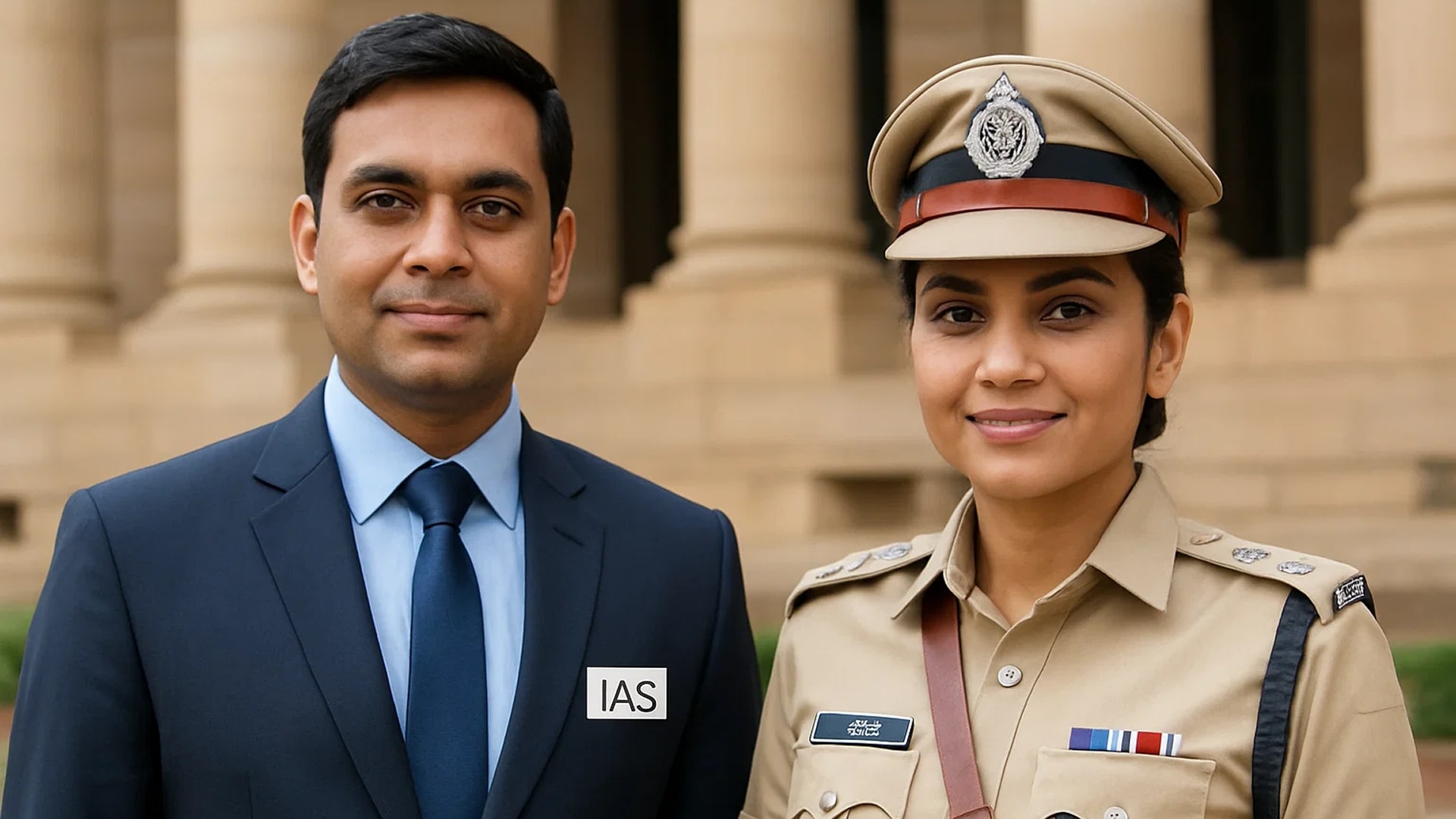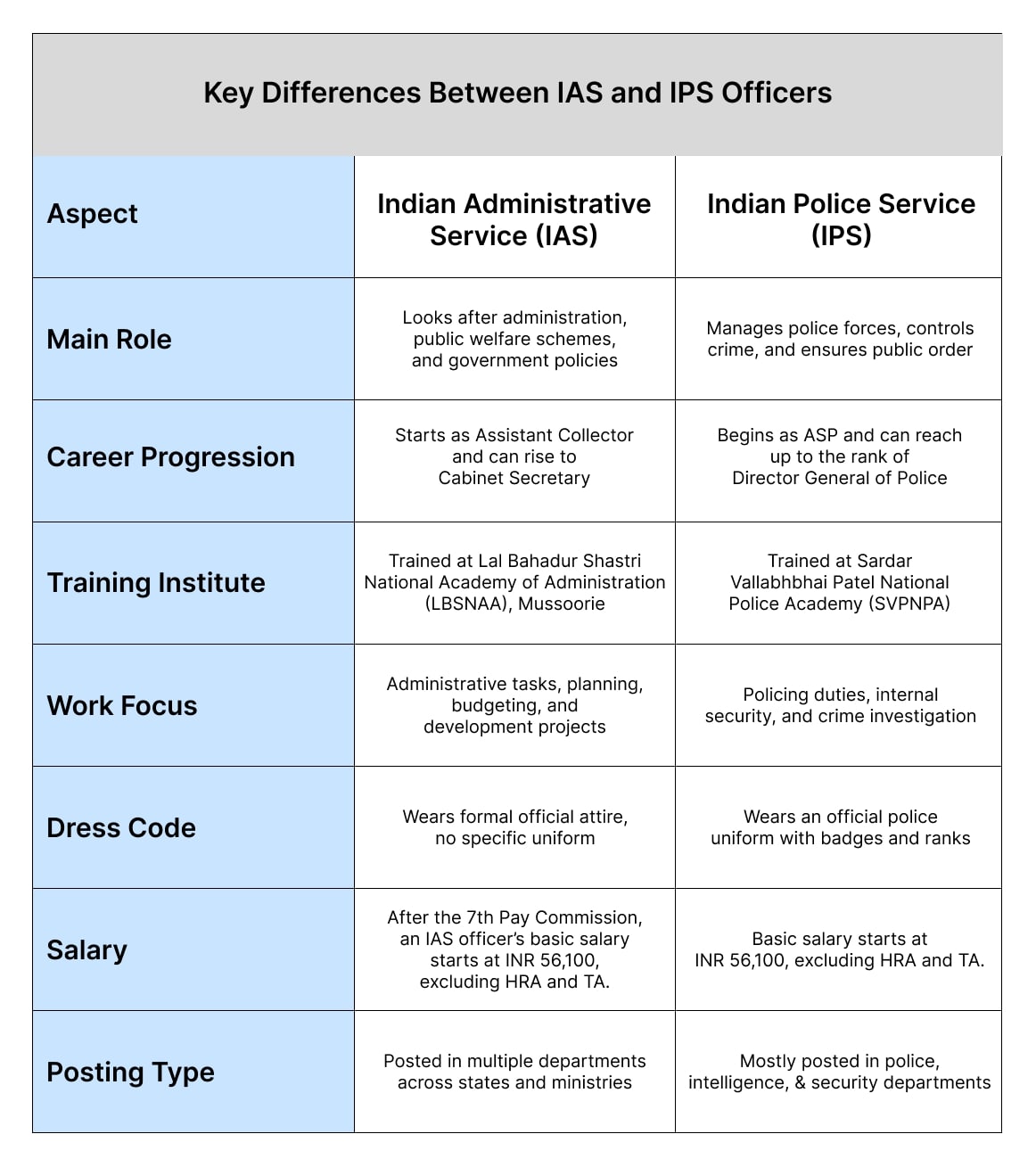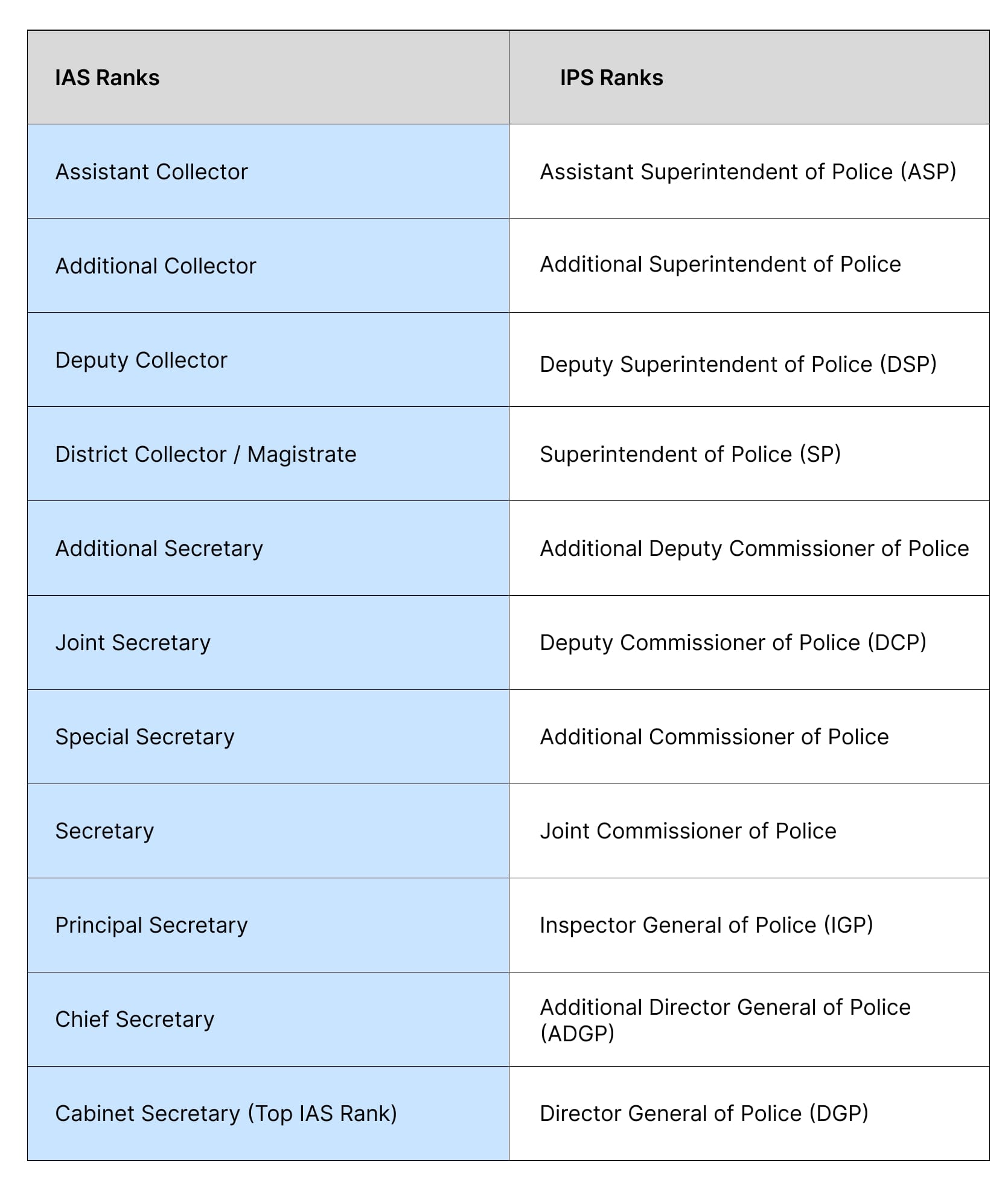July 29, 2025

If you’re dreaming of a government job through UPSC, chances are you’ve asked yourself, “Should I go for IAS or IPS?”
Both are powerful, respected positions. But they’re not the same. From the kind of work you’ll do to the uniform you wear, and even the type of training you get, IAS and IPS offer very different career paths.
In 2024, more than 13.4 lakh aspirants appeared for the UPSC Civil Services Exam, all competing for just 1,105 vacancies. So, choosing the right role for your interests and strengths matters more than ever.
In this article, you will learn the key differences between IAS vs IPS, including salary, responsibilities, training, and career growth.
TL;DR

When you're preparing for the UPSC Civil Services Exam, one of the biggest choices you’ll face is between the Indian Administrative Service (IAS) and the Indian Police Service (IPS).
Below is a simple comparison that shows how IPS vs IAS differ in work profile, career path, training, and perks.

While both IAS and IPS officers are part of the All India Services and are recruited through the same UPSC exam, their career paths and rank structures differ once they enter their respective services. Their ranks, responsibilities, and promotion timelines are shaped by the nature of their work and the department they serve.
Here's how both services match up from their initial appointments to their highest designations.

If you're planning to appear for the UPSC Civil Services Examination, knowing the eligibility rules for IAS and IPS is your first step. While both fall under the same exam and follow a common selection process, there are some specific eligibility conditions you must meet, especially for IPS.
Let’s break down the key eligibility rules for both services.
When it comes to official appearance, IAS and IPS officers follow different rules. Your attire reflects your role, and in the case of civil services, it also signals your authority and responsibilities.
Here’s how the uniform policies differ between the two:
Once you clear the UPSC exam and are allotted a service, the real journey begins with training. This training helps you build the mindset, skills, and knowledge needed for your responsibilities.
Here’s how IAS and IPS training are different.
Both IAS and IPS officer trainees begin their journey at the Lal Bahadur Shastri National Academy of Administration (LBSNAA) in Mussoorie. This is where they attend a 3-month Foundation Course that includes physical fitness, basic administration, law, ethics, and interaction with peers from other services.
After the foundation course, IAS officers continue at LBSNAA for their professional training. IAS training focuses more on policy-making, revenue collection, development work, and district management.
The IAS trainee who secures the top position during training is honoured with the President’s Gold Medal.
IPS officer trainees move to the Sardar Vallabhbhai Patel National Police Academy (SVPNPA) in Hyderabad after their foundation course. Their training includes:
IPS training is designed to prepare officers for handling law enforcement, internal security, and managing police forces. Prime Minister’s Baton is awarded to the highest-ranking IPS trainee officer.

When it comes to serving the country, both IAS and IPS officers play key roles. These two services are part of the three All-India Services and work at the central and state levels to ensure governance, security, and development.
Let’s break down the core responsibilities of each.
1. Policy and Planning Work
IAS officers participate in drafting, revising, and implementing government policies at the district, state, and central levels, collaborating with ministers and experts.
2. Administrative Management
They take charge of various departments and ensure that government schemes and services are implemented properly. Their work spans education, health, revenue, and more.
3. Overseeing Development Projects
IAS officers supervise infrastructure and welfare projects, like roads, schools, and health centres, making sure they are completed on time and serve the public well.
4. Crisis and Disaster Response
In case of floods, droughts, or other emergencies, IAS officers lead the relief efforts in their areas, ensuring essential aid reaches those affected.
5. Public Complaint Handling
They address complaints from the public and ensure citizens get timely redressal of issues related to government services.
6. District-Level Leadership
As District Collectors or Magistrates, IAS officers are responsible for maintaining law and order, managing elections, revenue collection, and overall governance at the district level.
1. Law and Order Maintenance
IPS officers are responsible for managing the police force and ensuring peace and safety in their assigned regions.
2. Crime Control and Investigation
They supervise investigations of major crimes, coordinate with forensic experts, and ensure that criminals are brought to justice through proper legal channels.
3.Citizen Protection
From patrolling city streets to handling emergencies, IPS officers work to make sure people feel safe in their communities.
4. National Security and Intelligence Coordination
They work with intelligence and security agencies to track threats like terrorism, organised crime, or cybercrime.
5.Traffic and Road Safety
In urban areas, IPS officers manage traffic systems to reduce accidents and improve safety.
6. Special Units Oversight
They lead specialised wings like Anti-Terrorism Squads (ATS), Narcotics Bureaus, Cybercrime units, and Economic Offences Wings, depending on regional needs.
7. Training and Mentoring Junior Officers
Senior IPS officers help train and guide their junior officers, ensuring that the police force is well-prepared for various challenges.
Want to crack the IAS with confidence? Join ICS Institute for Competitive Examinations, Dharwad, and get expert coaching for IAS, regular mock tests, and personal mentorship from day one.
When it comes to government jobs in India, both IAS and IPS officers enjoy attractive salaries along with a host of allowances and perks. However, the nature of the job, promotion pace, and type of responsibilities can influence long-term earnings and benefits.
Here's a breakdown for better clarity.
Both IAS and IPS officers begin their careers at the Pay Level 10, with a basic salary of INR 56,100 per month. In addition to this, officers are entitled to allowances like:
These can significantly increase the take-home salary, especially for those posted in metro cities or hardship zones.
As they move up the ladder, their salaries increase with promotions and seniority:
While both roles offer the same maximum salary, IAS officers often reach senior positions faster, as they are eligible for a wider range of roles across departments and ministries.
IAS officers usually get faster and more diverse promotions, often getting posted to central ministries, state secretariats, and international assignments. This broader scope leads to quicker salary hikes and more power-associated perks.
On the other hand, IPS promotions depend heavily on vacancies and cadre rules, which can sometimes delay upward movement in the hierarchy.
While both officers work for the Indian government and are recruited through the UPSC Civil Services Exam, their powers differ based on their responsibilities, roles, and departments.
Here’s a breakdown of how power is distributed between IAS and IPS officers:
Choosing between IAS and IPS is about where your passion lies. If you’re drawn to policymaking, administration, and governance, the IAS gives you the platform to drive major development decisions. But if maintaining law and order, investigating crime, and upholding justice excite you, the IPS might be your true calling.
Evaluate your strengths, understand the roles deeply, and then make your decision. Either way, you're choosing a path that serves the nation.
Get the clarity you need at ICS Institute for Competitive Examinations, Dharwad. From expert-led coaching for IAS to regular mock tests, bilingual support, and personal mentorship, ICS helps aspirants like you prepare confidently for UPSC, KAS, and other state-level exams.
Need structured guidance for the IAS exam? Join ICS today and take the first step toward a successful civil services career.
1. What are the main differences between IAS and IPS?
IAS officers focus on policy implementation and administration, while IPS officers are responsible for law enforcement and maintaining public order.
2. Which is more powerful, IAS or IPS?
IAS officers are generally considered more powerful as they oversee various departments and have a broader scope of authority compared to IPS officers.
3. What are the salary differences between IAS and IPS officers?
IAS officers typically earn higher salaries due to their administrative roles, while IPS officers have competitive salaries with additional perks related to field postings.
4. What roles do IAS and IPS officers play in governance?
IAS officers manage government policies and administration, whereas IPS officers enforce laws and ensure public safety.
5. What are the career paths for IAS and IPS officers?
Both IAS and IPS officers have distinct career trajectories, with IAS focusing on administrative roles and IPS on law enforcement and security.
6. What training do IAS and IPS officers undergo?
Both IAS and IPS officers undergo rigorous training at the Lal Bahadur Shastri National Academy of Administration and the Sardar Vallabhbhai Patel National Police Academy, respectively.
7. What perks do IAS and IPS officers receive?
IPS officers often receive higher field-related perks, while IAS officers enjoy benefits related to administrative positions, including housing and travel allowances.
8. How do the ranks differ between IAS and IPS?
IAS officers hold higher ranks in the government hierarchy, while IPS officers have a distinct ranking system focused on law enforcement roles.
Boost Your Confidence & Competitive Skills